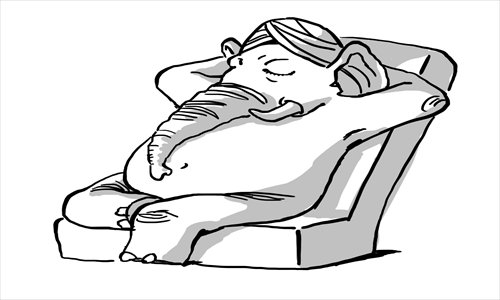Happy Indian mentality keeps on rising

Is it possible for an Indian to be happy in India? On the face of it there is nothing for an Indian to be happy about in the country: a venal, self-seeking political class dedicated to aggrandizing and enriching itself; growing economic disparity; rising cost of life and living; increasing corruption and crime; mounting inequalities; little value for human life, health and education; a vast majority - deprived of water, shelter, food, education, healthcare and minimum needs - uncared for and all but abandoned by the state.
Yet there is an entity called the "Happy Indian," transcending class and occupation. If the middle class feels "exploited" at being heavily taxed and having to pay a high cost for the poor quality of living standards it has to put up with, it is also the happiest.
Time was when the middle-class man, for example, living in Delhi had to queue and jostle his way into a bus, which might break down en route, leaving him stranded without a rickshaw or taxi; without a phone anywhere in sight to call in that he would be late for work.
Yet on the way back home, the middle-aged, middle-class man thanked his stars for having survived a difficult day. By way of thankfulness he, probably, picked up flowers for the deity in the roadside shrine, fruit for the wife, toffees for the kids and, perhaps, a drink for himself. Why not, he would tell himself, when I have had a hard day?
Today, this middle-class Indian feels rewarded and, therefore, "happy." Life has come full circle: He drives to the office in a car of his choice, as does his wife; the kids are safe traveling to school and back in a world-class metro or a secure bus; there are phones everywhere - in the office, in the home and in their hands; food of all kinds is available at all times; the shops are full of goodies that he can buy with his credit card; and, if there's a goodie that can't be found, he can order it on the Internet.
There are computers, TVs, films, video games and every gizmo in his house which is powered 24/7 with a generator. In short, life's good. Maybe there is not enough money for a larger house, but for everything else.
True, he should be earning 20 times more than he does - after all, he did all the hard work setting up that venture in Silicon Valley before moving to the Indian end of the operations. He has to guard against excess drinking, smoking or eating given his high cholesterol, diabetes and weight. He needs exercise more than watching TV series and cricket matches or sitting around in clubs.
But it is certain that he won't be doing what the doctor - medical or economic - ordered. Life's dark sides are grim enough without brooding over it in the little time between the end of a day's work and going to bed. He thanks his stars, gods, fate or whatever, and retires every night to rise again and shine through another day.
The Indians, unlike the Chinese or the Americans, has the extraordinary ability to be satisfied and find contentment, even if his yearnings and cravings remain unfulfilled. They are not "driven" to constantly earn money, develop themselves and keep pushing up the country's GDP. An Indian will be what he is fated to be, or so he believes. There's nothing Protestant or Confucian about him and his economic values.
A professor living in a two-bedroom flat hardly loses sleep over the taxi service owner living in a much larger house. He tells himself: I have a PhD, thousands of students listen to my lectures, my papers and books are published and read in India and abroad, my wife is educated and talented, I may not be wealthy, but I have more than enough from eight to 10 hours of decent work in a famous university, I have social security and medical coverage for myself and my family. My kids won't starve or be jobless. Why should I chase more? I should enjoy what I have and can afford, including the joys of leisure.
On the other hand, the taxi service owner is content with his lot: I am lucky that despite lack of education, I have managed a safe, profitable business that keeps me and my family well-fed; and have enough money for my daughter's marriage, son's education and my parents' medical expenditure.
Neither the academic who has a steady, secure and tenured job, nor the small-time taxi owner will take risks. They will not seize opportunities to increase their income or assets - because of the risk of losing a bit of their assured earnings.
Both are averse to a few more hours of work a day, because it means less time meant for recreation, relaxation and socializing with friends and family members.
There are no "tiger" moms in India - and if there are, they are certainly not celebrated like in China. The Indian parent in China is weary of being asked: "Your child just does school, eh? Why not after-school sports, music and dance?"
The Indians attach great importance to leisure. Rest, relaxation, recreation are more important than growth, development and success - for most individuals, at least
This may be a colonial hangover, but leisure is valued, especially for pursuit of the arts and creative activities. The problem is not with demarcated leisure. As the Chinese or Americans might observe, the Indians are leisurely about everything. Even his "working" lunch is leisurely and can extend to a few hours. The rush hour and the rat race are for others - or so an Indian tells himself.
The author is a journalist and writer. He is director of the National Centre for Advocacy Studies in Pune, India, and a member of the editorial board of IDN-InDepthNews, Berlin. opinion@globaltimes.com.cn